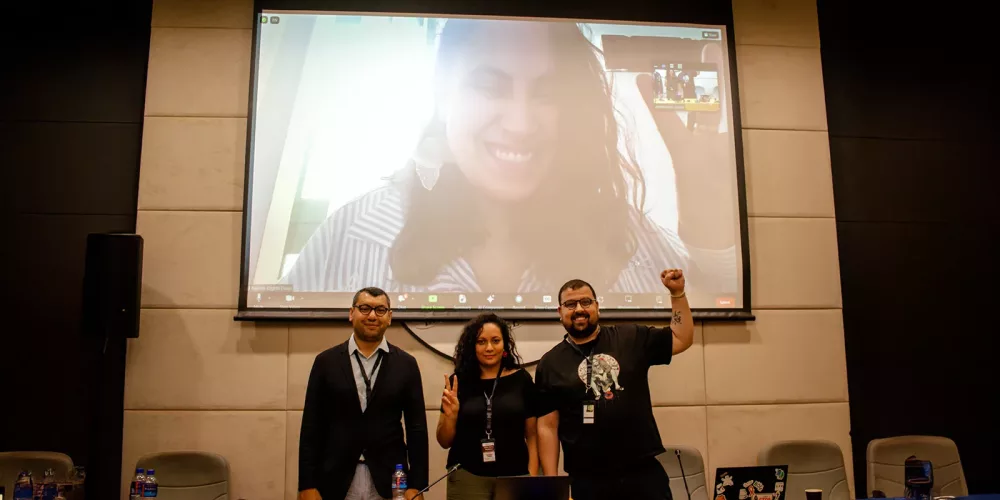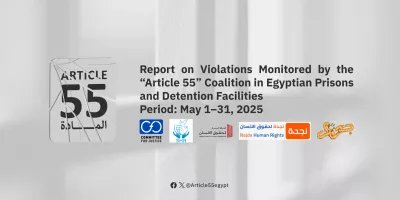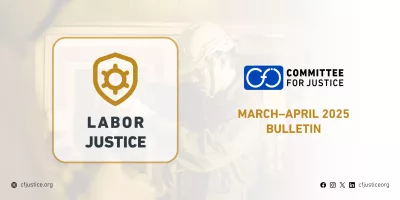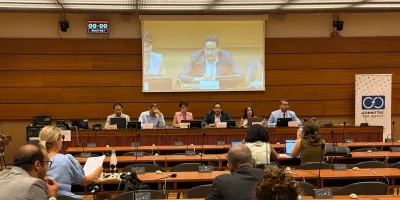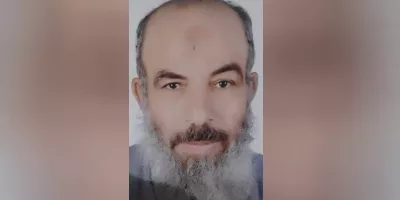The Committee for Justice (CFJ) has organized a side event on Saturday, May 3rd, at 2:30 PM, at the Sir Dawda Kairaba Baba Jallow International Conference Centre in Banjul, The Gambia, within the framework of its “Country Review” project, addressing the human rights situation in Tunisia during the period between the previous and current sessions of the African Commission on Human and Peoples’ Rights. The event focused on the most significant events, violations, and changes that have affected the human rights situation in the country, whether through escalating crises or emerging signs of progress.
– Risk of Institutional Dismantling:
In her opening remarks at the event, Fatima Al-Mutamari, Assistant for Documentation and Communication at the Justice Commission, stated: “Since July 25, 2021, Tunisia has witnessed the danger of dismantling institutions and the balance among them, marked by erosion of judicial independence, weakening of democratic guarantees, and increasing repression against civil society. However, voices are now rising, which we will learn about today.”
– A Deliberate Political Project to Neutralize Opposition:
For her part, Nour Els Zoughbi Al-Douzi, a Tunisian human rights defender and activist, said: “After dissolving the High Judicial Council, we no longer have what we call neutral judges. We are no longer allowed fair trials in Tunisia. The current regime actively exploits state institutions to dismantle us, deprive us of our existence and rights—even within courtrooms. What we witness these days is that we have judges fearing for their professional lives, and lawyers being imprisoned for defending human rights defenders or political opponents.”
In response to a question regarding how the repressive campaign has affected the already limited civic space in Tunisia, Al-Douzi said: “The current regime in Tunisia does not merely restrict civic space; it actively works to reshape state institutions and dismantle what remains of the civic sphere. This is not just a temporary reaction or misleading political choice—it is a deliberate political plan aimed at neutralizing opposition, dismantling social resistance, and suppressing collective organization. What we are witnessing today is the systematic criminalization of any vision for a better Tunisia.”
– Defending the Right of Tunisians to Access Regional Mechanisms:
Meanwhile, Hamza Nsiri, a Tunisian human rights defender, spoke about Tunisia’s withdrawal from the African Court’s Optional Protocol: “Everything is clear and interconnected. We started with Decree 117, followed by dismantling the judicial council, which eventually led to rulings we witnessed last month—60-year prison sentences for political prisoners in Tunisia. Therefore, everything has been connected since the beginning of President Kais Saied’s rule.”
Nsiri added: “When it comes to regional mechanisms, I believe we have become used to considering this a great field of work for human rights defenders, NGOs, and individuals to engage with regional mechanisms. I remember that in a recent session, I made an intervention where I expressed pride in the ruling of the African Court on Human and Peoples’ Rights. But a few months later, the regime withdrew and Tunisia ratified the decision. That is why I believe the Tunisian regime understands how important this regional mechanism is because when Tunisian human rights defenders resort to it, no one can accuse them of working for a Western agenda. The Tunisian regime, unable to dismantle things through populism, uses regressive and repressive decisions such as withdrawing from the African Court’s Optional Protocol.”
He continued: “I encourage my fellow human rights defenders to defend the right of individuals and NGOs in Tunisia to communicate with regional and international mechanisms, because as one colleague said today, this is the place where we can fight them and win our battle when it comes to law. This is the place where we can fight and win our case.”
Responding to a question about the role the African Commission should play in responding to the erosion of the rule of law in Tunisia, Nsiri said: “Our presence here is a declaration that we still believe in regional mechanisms and that we consider the African Commission extremely important for the functioning of the human rights system and national organizations in Tunisia. We rely heavily on the African Commission; my colleagues and I drafted a resolution proposal for the Commission, and we hoped it would be adopted. We also have oral statements to further explain to the audience what is really happening in Tunisia.”
Nsiri added: “Today in Tunisia, there are mass arrests targeting politicians, large-scale deportation and removal of migrants, political prisoners subjected to torture and deprived of basic health care and family visits. Lawyers are now being targeted—if you are a human rights lawyer defending political prisoners, you may find yourself targeted and accused of terrorism-related charges.”

